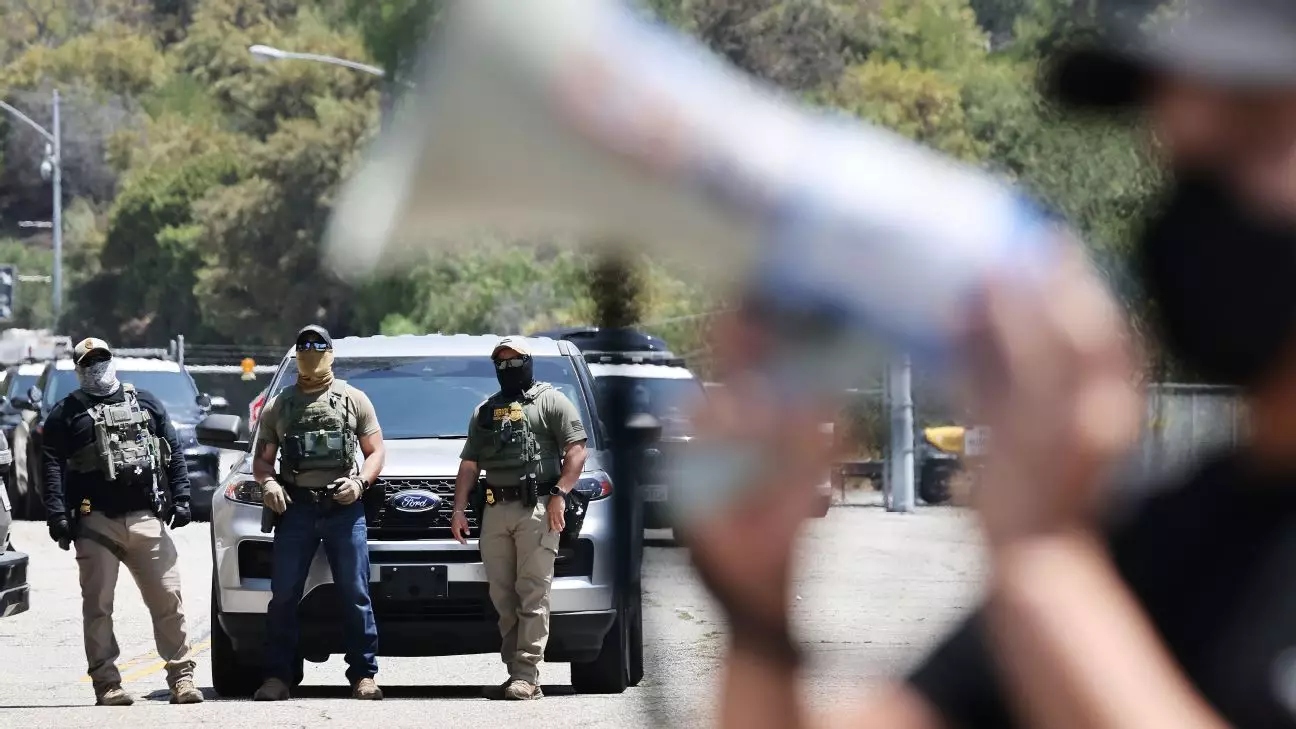On a seemingly typical Thursday morning in Los Angeles, the atmosphere morphed into a battleground of ideologies when federal agents deployed outside Dodger Stadium, inciting outrage and widespread protests against immigration enforcement. This alarming turn of events has sparked discussions regarding the intersection of sports, community engagement, and civil rights. The presence of agents from the Department of Homeland Security (DHS) at such a public venue raises significant questions about governmental practices in communities with high immigrant populations.
The Los Angeles Dodgers found themselves in an unexpected and tumultuous clash between federal authority and community sentiment. In denying federal agents access to their parking lot, the Dodgers signified a willingness to take a stand for the vulnerable populations that define Los Angeles. Unfortunately, what should have been a moment of solidarity quickly descended into chaos and confusion.
Community Response and Solidarity
Following the arrival of federal agents, an immediate wave of protests flooded the venue. Activists flocked to Gate E, the downtown-facing entrance of the ballpark’s parking lot, voicing their discontent with immigration enforcement practices. This grassroots mobilization reflects a robust civic engagement that underscores the importance of localized responses to top-down policies. The Dodgers’ decision to delay unveiling initiatives aimed at empowering immigrant communities showcases how sports organizations can serve as potent platforms for social issues. However, the anxiety surrounding immigration enforcement looms large, particularly when federal agents are present at prominent cultural events.
Social media erupted with commentary, ranging from vocal support for immigrants’ rights to vehement criticism of federal actions. This incident has crystallized tensions surrounding immigration policy in a city synonymous with diversity and cultural richness, compelling the Dodgers to confront their potential role as advocates for social justice amidst mounting outrage.
The Political Landscape of Immigration Enforcement
The escalation of protests in response to federal enforcement actions is not isolated. Earlier incidents that involved the arrest of dozens of workers in the city have ignited a broader movement direly concerned with the fate of immigrant families, workers, and communities. These tensions have also been exacerbated by the deployment of National Guardsmen and military personnel, deemed unnecessary by local leaders, who altogether signal an alarming trend of aggressive immigration tactics.
The Dodgers previously faced criticism for their lack of public support for immigrants. Yet, amid the backdrop of federal encroachment on civic life, the team has recognized the imperative to align with community needs. Their attempt to forge connections with local immigrant groups could pave the way for a transformative relationship between sports teams and social justice movements.
Still, it’s evident that merely postponing an announcement does not fully address the societal complexities at play. While the team’s leadership continues to engage with immigrant organizations, they must not shy away from taking a definitive public stance. In uncertain times, the silence of influential institutions can breed a sense of isolation for marginalized communities.
Federal Authority and Community Resilience
The juxtaposition of federal authority and grassroots resilience was stark during the Dodger Stadium incident. As U.S. Customs and Border Patrol (CBP) agents found themselves momentarily thwarted, the community rallied, unified in their opposition to immigration enforcement tactics that many deem both cruel and unjust. This grassroots activism is a powerful reminder that vulnerable communities often have the capacity to mobilize quickly and assertively against oppressive forces, a testament to the strength of solidarity.
Although the DHS later downplayed the incident, claiming the agents were “briefly” in the parking lot and unrelated to any enforcement action, this narrative does little to alleviate the fears of those living in the shadow of constant surveillance. For many, ICE and CBP actions are not mere bureaucratic operations but life-altering events that can shatter families and communities.
The actions taken by the Dodgers, whether through denial of access or future commitments to supporting local initiatives, crystallize the pivotal role sports franchises can play in societal discourse. The ongoing struggle against immigration enforcement in Los Angeles reflects a broader national dialogue about human rights, justice, and the role of public figures in representing the values of the communities they inhabit.
Ultimately, the question remains: how far will institutions, both in sports and beyond, prioritize socio-political commitments in the face of unwavering federal authority? In many ways, the Dodgers’ responses could set a precedent for how sports institutions engage with their communities regarding pressing societal issues.

